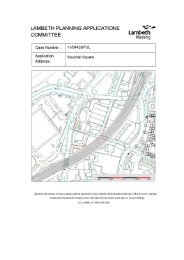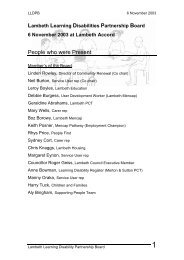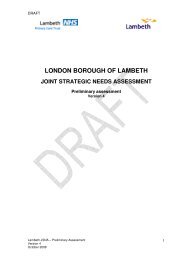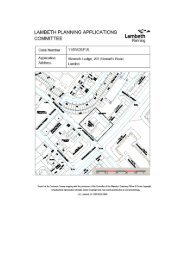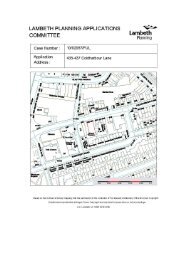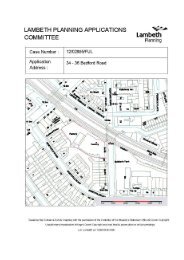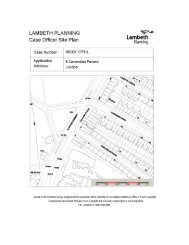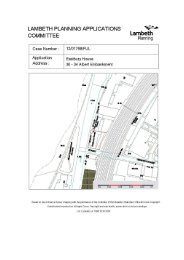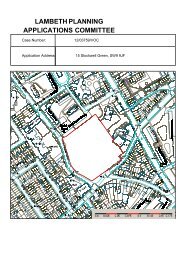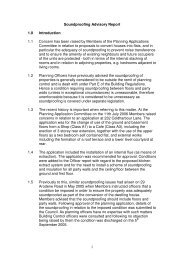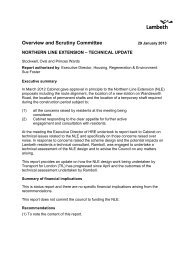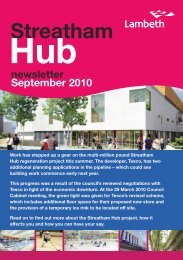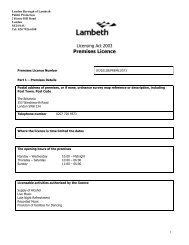London Plan 2011 PDF 1 MB - Lambeth Council
London Plan 2011 PDF 1 MB - Lambeth Council
London Plan 2011 PDF 1 MB - Lambeth Council
Create successful ePaper yourself
Turn your PDF publications into a flip-book with our unique Google optimized e-Paper software.
The <strong>London</strong> <strong>Plan</strong> July <strong>2011</strong> – RTF version<br />
<strong>London</strong>er consumes 161 litres/day (l/d) 118 , seven per cent above the national<br />
average of 150 l/d. Projections for population growth in <strong>London</strong> and in the<br />
wider south-east will mean that over the period of this <strong>Plan</strong>, new strategic<br />
water resources will be required. The need for this is exacerbated by the<br />
climate change predictions of more sporadic and intense rainfall and a higher<br />
likelihood of droughts. Retrofitting water efficiency measures in existing<br />
buildings provides scope for considerable water savings (see Policy 5.4).<br />
Further detail relating to <strong>London</strong>’s water and wastewater infrastructure is<br />
contained in the Mayor’s Water Strategy. The Mayor will examine the<br />
effectiveness of the Code for Sustainable Homes ‘water calculator’ approach<br />
to water use standards compared to a ‘fittings based’ approach such as that<br />
suggested by the Association of Environmentally Conscious Builders.<br />
5.62 The Mayor is committed to explore the concept of ‘water neutrality’ to help<br />
to address these issues. The basic premise is that development should not<br />
lead to an overall rise in demand for water. The definition of water neutrality<br />
used by the Government and the Environment Agency is:<br />
“For every new development, total water use across the wider area after the<br />
development must be equal to or less than total water use across the wider area before<br />
development.”<br />
This concept needs further refinement and examination of its effects and how<br />
it could be implemented before it can be used in development plan policy.<br />
The <strong>London</strong> Water Resources Group chaired by the GLA will investigate<br />
this and the outcomes will feed into the next review of the <strong>London</strong> <strong>Plan</strong>.<br />
5.63 Alternative sources of water, such as rainwater and greywater, particularly<br />
for uses other than drinking, will be increasingly important to reducing our<br />
consumption of mains water. It is important to have a positive planning<br />
approach to providing a more sustainable and secure water supply<br />
infrastructure.<br />
5.64 After major industrial abstractions of groundwater stopped, parts of <strong>London</strong><br />
(including the Underground, basements and underground services) were at<br />
risk of groundwater flooding. This issue has now been addressed with<br />
abstractions at additional Thames Water boreholes. It is currently thought<br />
that groundwater levels will not be particularly affected by climate change.<br />
The position will be monitored, and alterations to the <strong>London</strong> <strong>Plan</strong> will be<br />
brought forward if necessary.<br />
Waste<br />
5.65 The Mayor is committed to a policy framework for waste management which<br />
starts from the position the best approach is to reduce the amount of waste<br />
that arises in the first place. Where this is not possible, he supports an<br />
approach based on the waste hierarchy that emphasises re-use, and then<br />
recycling and composting, before energy recovery and disposal. Generally,<br />
applying the waste hierarchy will achieve the greatest carbon dioxide<br />
equivalent savings. However, there are certain circumstances where the<br />
waste hierarchy conflicts with achieving the greatest climate change benefits.<br />
118 Environment Agency. State of the Environment Report. Environment Agency, February 2010<br />
Page 152 of 310



